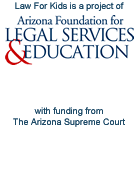 |
Speak Up! - View Question #23662 |
 printer friendly version printer friendly version
Question: can a pros. att. use a witness that he knows is perjuring himself on the witness stand? and can he with hold evedence from the court to help him win his case?
Answer: Lawyers are regulated by very strict rules of professional conduct. Those Rules are created and enforced by the Arizona Supreme Court. One of those Rules prohibits a lawyer from knowingly giving false information to a court. This means that a lawyer ethically cannot permit a witness to lie. There are some Constitutional considerations, however, in criminal cases, where defendants have the right to testify in their own case. If a lawyer is representing a criminal defendant, and the defendant wants to testify and the lawyer thinks the testimony might not be true, the lawyer cannot assist the defendant in putting that information before the court – the defendant basically just sits on the witness stand and tells his or her story without the lawyer asking any questions. If a lawyer helps a client or someone else lie in court, the lawyer most likely will lose his or her license to practice law.
The Rules that regulate lawyer conduct also prohibit a lawyer from hiding or destroying relevant evidence. The Rules of Evidence also require that lawyers safeguard and produce any information that could lead to admissible evidence – in both criminal and civil cases. A lawyer (and the client) can be severely sanctioned (fined or have the case dismissed) if a court finds out that a lawyer concealed or destroyed evidence. The lawyer also could be subject to discipline by the Arizona Supreme Court, which regulates lawyer conduct. The Rules of Professional Conduct that regulate lawyer conduct may be found at: http://www.myazbar.org/Ethics/rules.cfm.
If someone is concerned that a lawyer has offered false evidence or failed to disclose material evidence, you can contact the State Bar of Arizona’s Attorney/Consumer Assistance Program at 602-340-7280. This program reviews concerns about Arizona lawyer conduct. If the problem is one that could be a violation of the Ethical Rules, the matter is referred to the State Bar’s Lawyer Regulation Department for investigation and possible prosecution.
|


















